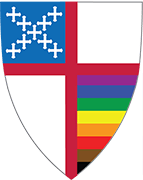The Rev. Pamela Dolan
Text: John 1:1-14
When you think about the Christmas story, the beginning of the Gospel of John is probably not the first thing that comes to mind. Imagine a children’s Christmas pageant that did away with shepherds in bathrobes, wise men in tinfoil crowns, and sheep with little fluffy tails, and decided to portray instead the eternal Word, who was with God and who was God, who was in the world and through whom the world came into being, who was the life and light of all people. That would be quite an undertaking!—interesting, perhaps, but not nearly as heartwarming as our usual Christmas productions.
Today’s readings may not lend themselves to a pageant or to easy storytelling, but they do express the very heart of the Christmas message: “The Word became flesh, and lived among us, and we have seen his glory.”
In the Christian faith, Jesus is not just a little baby who was born in a stable and went on to a life of service and teaching. He is the cosmic and eternal Christ, the anointed one, the Alpha and the Omega, the light of the world. And the fact that the Word became flesh and lived among us, that God became human and pitched his tent with us, is a mystery too great for any of us to comprehend, no matter our theological training or number of years on this earth.
Which is, somewhat paradoxically, exactly what makes the image of that little baby in the manger so important—it is so much easier to grasp, so much more accessible, approachable, relatable than light from light, true God from true God and all that.
Something else is important about a baby as a symbol. As adults, we tend to look at other adults and register all sorts of things about them that mark them as either like us or not like us—things like gender, age, and skin color, but also things like profession, level of education, and political leanings.
By contrast, when we see a baby, or a very young child, we see something universal. A baby reminds us that, at a cellular as well as a spiritual level, we are all essentially the same. We come into this world the same way, naked and vulnerable and utterly dependent on others to care for us, clean us, feed us, and love us. And somehow, somehow, somehow God came into the world that way, too. It’s a great mystery indeed.
Luckily, we don’t have to fully understand the mystery of the Incarnation to celebrate Christmas. Rather, I think our job is to look for signs of Christmas in the world as we know it—and not only to look for those signs, but to do our best to become those signs for others.
Bishop Steven Charleston put it beautifully in a recent Facebook post when he wrote, “Some may say that the incarnation of the divine into human form is impossible, but I would invite them to reconsider, for I have seen the incarnation of the holy many times, and I believe you have too. I have seen it in the helpless innocence of a newborn life. I have seen it in the eyes of a deep love. I have seen it in the courage of a single individual to do what is right, no matter the cost. The holy is incarnate among us. We have only to open our eyes to see it.”
Christmas is one of those moments in time that invites us, year after year, to open our eyes to see the holy incarnate among us. It is not mere sentimentality that has us retelling old family stories, singing familiar songs, and making recipes we’ve made a hundred times before. It is that those beloved traditions are ways that we make the holy incarnate. They are like a million invisible threads, binding us together across time and space. They help us remember that, wherever we are and whatever else is happening, we can choose to be at home in our own bodies and on the earth, we can choose to find our own incarnation holy, and seek out those glimmers of glory in others.
A Baptism, like a baby, is a sign of hope. In a world that can be cynical and cold and so very cruel, a baptism proclaims the holiness of our bodies, the goodness of creation. It pushes back against the notion that the only things that count are things that can be counted, that our worth is decided by our ability to produce and consume. In our baptisms we are anointed to become one of the messengers who announce peace, who bring good news and proclaim salvation. We are welcomed into the household of God, and we find that there is no better place to be.
By becoming one of us, and one of us at our most vulnerable and defenseless, God broke down all the barriers that separate creation from creator, divine from human, self from other. God made his home among us, and in doing so proclaimed once and for all that our very ordinary, unremarkable lives are the most precious and brilliant things in the universe. That is reason enough to celebrate, not just at Christmas, but every day of the year. Amen.


